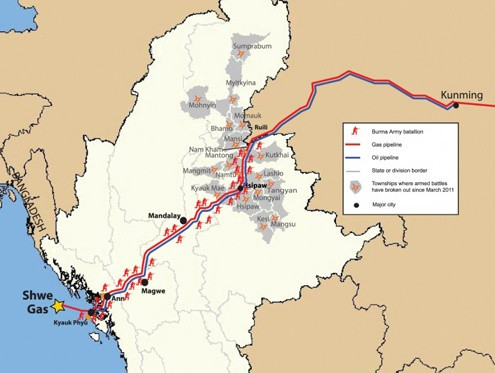Myanmar benefits from pipelines with China
- By Liu Qiang
 0 Comment(s)
0 Comment(s) Print
Print E-mail China.org.cn, July 9, 2014
E-mail China.org.cn, July 9, 2014
Nearly a year has passed since a natural gas pipeline formally went into operation last July linking Myanmar's deep-water port of Kyaukphyu with Kunming, the capital city of southwestern China's Yunnan Province. A parallel oil pipeline is expected to finish this year. As well as opening up a new energy corridor for China, the pipeline has benefited Myanmar immensely.
The natural gas pipeline starts from Kyaukphyu, and runs through Mandalay, Lashio, and Muse in Myanmar before entering China at the border city of Ruili in Yunnan Province.
|
|
| China-Myanmar oil and gas pipelines connect Myanmar's deep-water port of Kyaukphyu with Kunming, the capital city of southwestern China's Yunnan Province. [file photo] |
Construction started in October 2009 and in the following years the US$1.04 billion natural gas pipeline has created thousands of jobs for the Burmese people.
The Southeast Asia Pipeline Company, which is a subsidiary of CNPC, China's largest oil and gas producer, operates the pipeline, and now employs over 1,000 workers, including 500 Burmese. Forty seven Burmese employees currently hold managerial posts in the company. The company expects that in the future, 75 percent of managerial posts will be held by Burmese employees.
"I have been working here for over four years, and we are like a family. The whole village admires the fact that I have a job in a Chinese company. I feel proud too," Burmese employee Ang Nai said.
The life of Wu Juemin, a local resident in Kyaukphyu who runs an electrical appliances shop, has completely changed. Business was hard two years ago due to grave power shortages, and he could barely make ends meet. Since a natural gas power station was brought into use last July, the days of only having three or four hours of unstable power a day have gone. "Sales have doubled compared with two years ago. My shop can barely keep up with demand for refrigerators, air-conditioners and DVD players. It is the natural gas pipeline that has changed our lives," Wu said.
CNPC has been investing heavily in an attempt to gain a social approval in Myanmar. By the end of 2013, CNPC had helped to build 67 schools, two kindergartens, three hospitals, 23 healthcare stations, one nursing home and three orphanages along the nearly 800km-pipeline, benefiting more than 800,000 local residents.
Thanks to the gas pipeline, the newly built power plant in Mandalay has been providing stable power to 6 million people in central Myanmar, accounting for 10 percent of the entire population.
According to an agreement between China and Myanmar, the gas pipeline will deliver 20 percent of the expected annual capacity of 12bn cubic meters to Myanmar per year.
In addition, Myanmar will get 2 million tons of crude oil annually after the oil pipeline enters operation. Overall, the two pipelines will also be a great opportunity to boost Myanmar's petrochemical industry, as its economic growth rate is forecast at 7-8 percent in the following 20 years.






